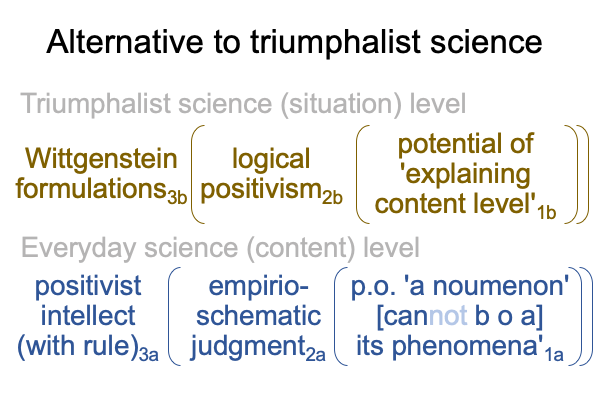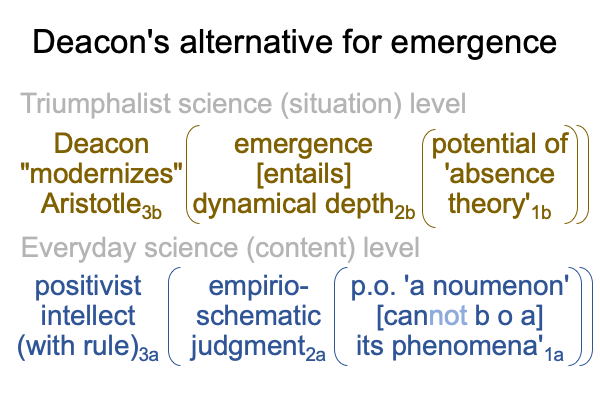0180 Triumphalist science?
A model replaces the noumenon?
Are models more real than things themselves?
I suppose that it depends on how one defines the spoken words, “more real”.
0181 First, there are fields of inquiry where mathematical and mechanical models are inadequate.
Around 1860 AD, when Charles Peirce realizes that the causality inherent in sign relations cannot be reduced to truncated material and efficient causes, he starts the postmodern discipline of semiotics.
Around 2010 AD, Mariusz Tabaczek realizes that the causality inherent in emergent phenomena cannot be reduced to truncated material and efficient causes, he enters a graduate program in order to explore the lacuna. This is the background story for his first book, titled Emergence.
0182 Second, alternatives are already on the horizon.
One alternative is analytical philosophy, where the normal context of Wittgenstein’s formulations3b bring the actuality of logical positivism2b into relation with the potential of various theories attempting to preserve the integrity of empirio-schematic models2a.
Here is a picture.

Tabaczek introduces this alternative in the introduction to Part 2 of Divine Action and Emergence and in chapter four of Emergence. Analytic philosophy proposes six views of causation for emergent phenomena. Tabaczek finds them all inadequate.
0183 A better alternative is Terrence Deacon’s approach, also discussed in Emergence.
Here, a disciplinary language inspired by Aristotle3b contextualizes the actuality of emergence [entails] downward causation2b in regards to the potential of constraints and biases applied to spontaneous processes1b.
Does that sound correct?
Maybe not.
“Downward causation” is too shallow. “Dynamical depth” sounds better.
Plus, “absence theory” can virtually situate emergent phenomena1a while accepting the noumenon’s metaphysical unity1a.

0184 Thus, Tabaczek’s introduction informs me (the examiner) that both of these contemporary approaches3b are viable once the positivist intellect3a becomes a ghost, unable to enforce its rule outlawing metaphysics.
I wonder, “How is empirio-schematic inquiry2a going to maintain itself, when the positivist intellect3a passes into shadow? What happens to the potential of phenomena and the lingering need to virtually situate the noumenon1a? “
Well, it cannot be too bad, because Part 1 is titled, “The Phenomenon of Emergence”.
